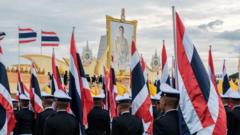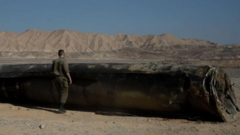Thailand's legal system has issued an arrest warrant for Paul Chambers, an American academic, igniting significant controversy surrounding the country's lese-majeste laws that prohibit insults to the monarchy.
US Academic Faces Arrest in Thailand Over Monarchy Insult Allegations

US Academic Faces Arrest in Thailand Over Monarchy Insult Allegations
A Thai court issues an arrest warrant for an American lecturer under strict lese-majeste laws.
Article text:
A Thai court has issued an arrest warrant for American academic Paul Chambers under the nation's lese-majeste law, which strictly prohibits insults directed towards the royal family. This action stems from a complaint filed by the army against Chambers, who is a lecturer at Naresuan University in central Thailand, involving allegations of "defamation, contempt or malice" towards the monarchy and accusations of importing and disseminating false computer data that could endanger national security or provoke public panic.
According to Chambers' legal counsel, he and his lawyer are expected to report to police on Tuesday to face charges. Should he be convicted, he could endure a prison sentence ranging from three to fifteen years for each count of lese-majeste. While it is uncommon for foreigners to be prosecuted under this law, precedent exists, as pointed out by Akarachai Chaimaneekarakate, advocacy lead for the Thai Lawyers for Human Rights Centre, which is representing Chambers.
The court's warrant was issued on Monday, while complaints regarding Chambers' conduct cite allegations including importing misleading data and disseminating it in a manner considered detrimental to national security. If charges are formally pressed, authorities could opt to either grant bail or detain him, after which police will conduct further investigations and potentially present the case to prosecutors for indictment.
Chambers, who has been engaged in lectures and research in Thailand for nearly three decades, including authoring works on the country’s military, has not previously faced any formal charges. His legal team emphasized that they have not received any subpoenas related to this case before now.
The controversial lese-majeste law has been part of Thailand's criminal code since 1908, with penalties having been significantly increased in 1976. The government maintains that it serves to protect the royal institution, while critics argue that it is employed as a tool for silencing dissent and undermining free speech. Notably, since a wave of student-led protests demanding military and monarchy reforms began in 2020, the law’s enforcement has dramatically escalated, with over 300 cases involving more than 270 individuals reported by the Thai Lawyers for Human Rights Centre, including cases involving minors.
Amid this legal climate, a reformist political party was dissolved last year following a court ruling that deemed its call for changes to the lese-majeste law unconstitutional. In response to growing international concern, including calls from the European Parliament to amend this legislation, the Thai parliament is anticipated to consider amnesty bills on the issue soon.
Overall, the recent developments surrounding Mr. Chambers signify the ongoing contentious nature of freedom of expression in Thailand, particularly within academic contexts, raising alarms over the risks academics face when addressing controversial political subjects.
A Thai court has issued an arrest warrant for American academic Paul Chambers under the nation's lese-majeste law, which strictly prohibits insults directed towards the royal family. This action stems from a complaint filed by the army against Chambers, who is a lecturer at Naresuan University in central Thailand, involving allegations of "defamation, contempt or malice" towards the monarchy and accusations of importing and disseminating false computer data that could endanger national security or provoke public panic.
According to Chambers' legal counsel, he and his lawyer are expected to report to police on Tuesday to face charges. Should he be convicted, he could endure a prison sentence ranging from three to fifteen years for each count of lese-majeste. While it is uncommon for foreigners to be prosecuted under this law, precedent exists, as pointed out by Akarachai Chaimaneekarakate, advocacy lead for the Thai Lawyers for Human Rights Centre, which is representing Chambers.
The court's warrant was issued on Monday, while complaints regarding Chambers' conduct cite allegations including importing misleading data and disseminating it in a manner considered detrimental to national security. If charges are formally pressed, authorities could opt to either grant bail or detain him, after which police will conduct further investigations and potentially present the case to prosecutors for indictment.
Chambers, who has been engaged in lectures and research in Thailand for nearly three decades, including authoring works on the country’s military, has not previously faced any formal charges. His legal team emphasized that they have not received any subpoenas related to this case before now.
The controversial lese-majeste law has been part of Thailand's criminal code since 1908, with penalties having been significantly increased in 1976. The government maintains that it serves to protect the royal institution, while critics argue that it is employed as a tool for silencing dissent and undermining free speech. Notably, since a wave of student-led protests demanding military and monarchy reforms began in 2020, the law’s enforcement has dramatically escalated, with over 300 cases involving more than 270 individuals reported by the Thai Lawyers for Human Rights Centre, including cases involving minors.
Amid this legal climate, a reformist political party was dissolved last year following a court ruling that deemed its call for changes to the lese-majeste law unconstitutional. In response to growing international concern, including calls from the European Parliament to amend this legislation, the Thai parliament is anticipated to consider amnesty bills on the issue soon.
Overall, the recent developments surrounding Mr. Chambers signify the ongoing contentious nature of freedom of expression in Thailand, particularly within academic contexts, raising alarms over the risks academics face when addressing controversial political subjects.





















